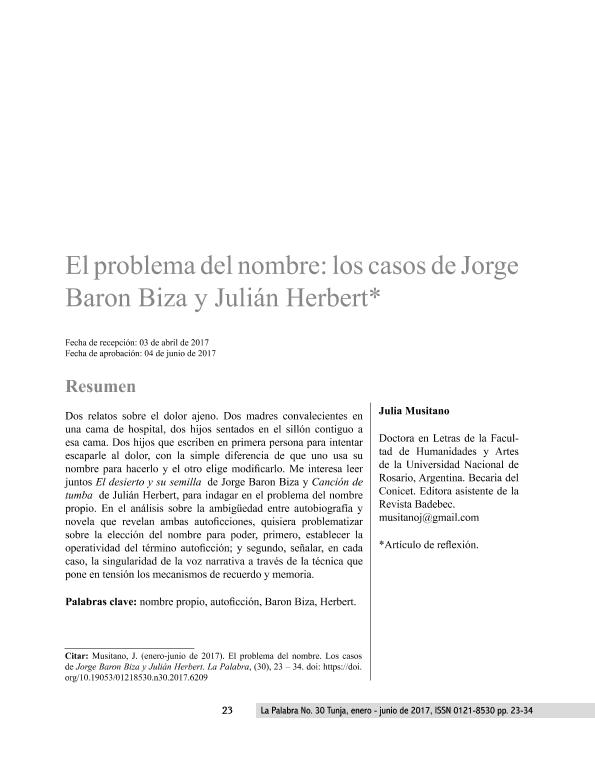Artículo
Dos relatos sobre el dolor ajeno. Dos madres convalecientes en una cama de hospital, dos hijos sentados en el sillón contiguo a esa cama. Dos hijos que escriben en primera persona para intentar escaparle al dolor, con la simple diferencia de que uno usa su nombre para hacerlo y el otro elige modificarlo. Me interesa leer juntos El desierto y su semilla de Jorge Baron Biza y Canción de tumba de Julián Herbert, para indagar en el problema del nombre propio. En el análisis sobre la ambigüedad entre autobiografía y novela que revelan ambas autoficciones, quisiera problematizar sobre la elección del nombre para poder, primero, establecer la operatividad del término autoficción; y segundo, señalar, en cada caso, la singularidad de la voz narrativa a través de la técnica que pone en tensión los mecanismos de recuerdo y memoria. Two texts about the pain of the other. Two convalescent mothers in hospital beds, two sons sitting in chairs next to their beds. Two sons writing in first person in order to escape the pain, with the simple difference that one of them uses his own name to do it and the other chooses to modify it. In this article I propose a parallel reading of Jorge Baron Biza ́s El desierto y su semilla [Desert Seeds] and Julián Herbert ́s Canción de tumba [Tomb Song], to examine the use of the proper name in both. In the analysis of the ambiguity between autobiography and novel, I ask questions about the use of the proper name in the two texts, in order, first of all, to establish the way in which the term “autofiction” operates; and secondly, to point, in each case, to the singularity of the narrative voice through this technique that creates tension between remembrance and memory. Deux récits sur la douleur d’autrui. Deux mères convalescentes dans un lit d’hôpital, deux fils assis dans un fauteuil á côté de ce lit. Deux fils qui écrivent en première personne pour échapper à la douleur. L’un utilise son mon, tandis que l’autre le modifie. On veut faire une lecture du roman Le désert et sa sémence de Jorge Baron Biza et de Canción de tumba de Julián Herbert pour étudier la problématique du nom propre. Il y a une ambiguïté entre autobiographie et roman dans les deux autofictions. Ainsi, dans une première partie, nous nous demanderons dans quelle mesure le choix du nom permet d’établir l’efficacité du terme autofiction. Dans une deuxième partie, nous signalerons la singularité de la voix narrative, dans chaque cas en particulier, à travers la technique qui met en tension les mécanismes de souvenir et mémoire.
El problema del nombre: Los casos de Julián Herbert y Jorge Baron Biza
Título:
The Problem of the Proper Name. The Cases of Jorge Barón Biza and Julián Herbert;
Le problème du nom: Les cas de Jorge Barón Biza et Julián Herbert
Le problème du nom: Les cas de Jorge Barón Biza et Julián Herbert
Fecha de publicación:
06/2017
Editorial:
Universidad Pedagógica y Tecnológica de Colombia
Revista:
La palabra
ISSN:
0121-8530
e-ISSN:
2346-3864
Idioma:
Español
Tipo de recurso:
Artículo publicado
Clasificación temática:
Resumen
Palabras clave:
Nombre Propio
,
Autoficción
,
Baron Biza
,
Herbert
Archivos asociados
Licencia
Identificadores
Colecciones
Articulos(IECH)
Articulos de INSTITUTO DE ESTUDIOS CRITICOS EN HUMANIDADES
Articulos de INSTITUTO DE ESTUDIOS CRITICOS EN HUMANIDADES
Citación
Musitano, Julia; El problema del nombre: Los casos de Julián Herbert y Jorge Baron Biza; Universidad Pedagógica y Tecnológica de Colombia; La palabra; 30; 6-2017; 23-34
Compartir




